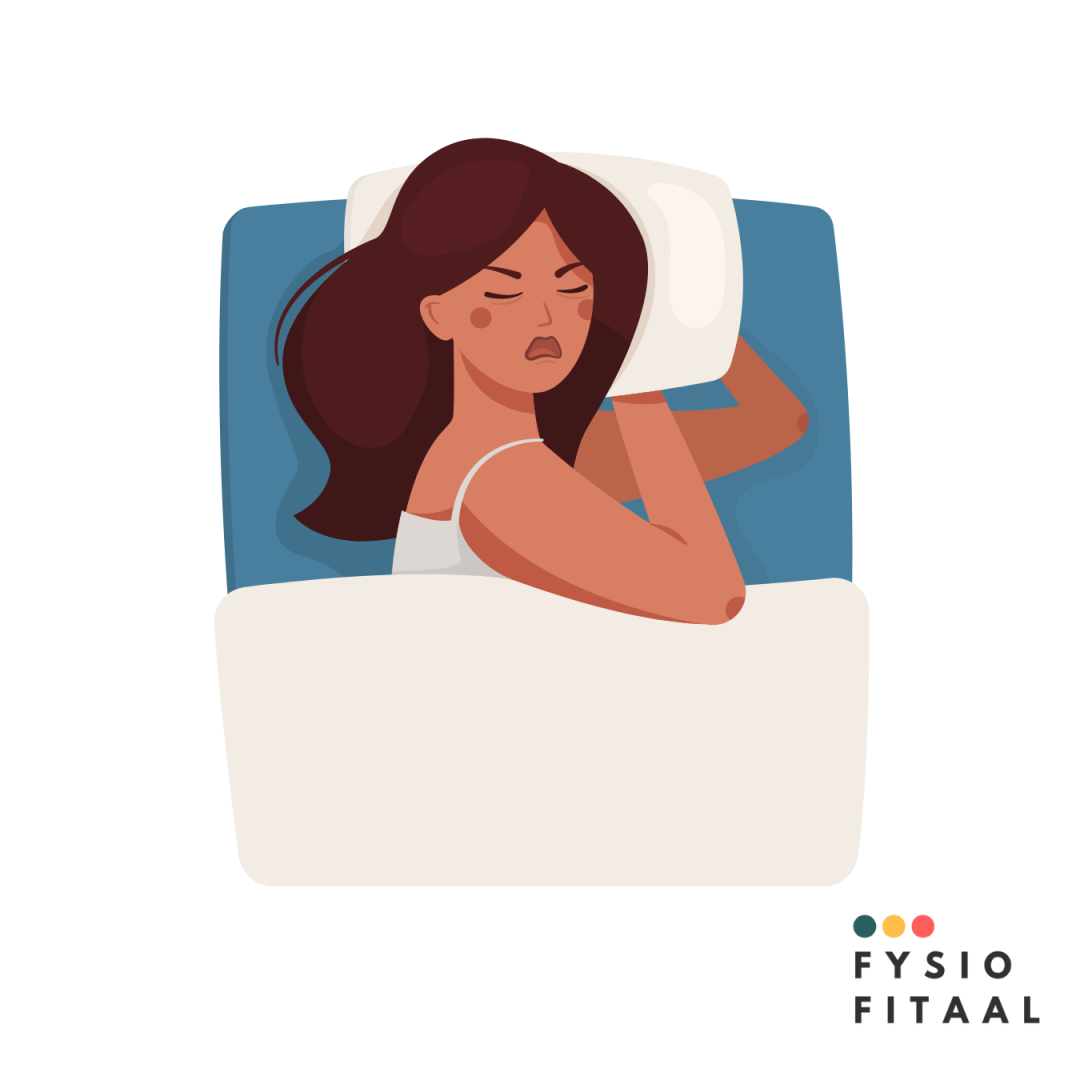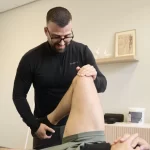Low back pain and sleep deprivation
In this fast-paced 24/7 society, sleep deprivation has become almost normal. We know that about 35% of all adults do not sleep enough. The reasons are often well known and not entirely foreign to most of us. Think long working days, lots of screen exposure and everyday stress. Sleep deprivation, besides being very annoying for you as a person, is also a public health problem. Disruption of sleep is a major problem and contributes negatively to various mental and physical complaints. We know that more than 30% of adults have problems related to proper sleep rhythm and more than 10% indicate major problem with insomnia also called insomnia in the medical world.
Insomnia, or insomnia, refers to problems falling asleep, sleeping through or waking up early, resulting in inadequate rest. It can be either short-term (acute) or long-term (chronic) and negatively affects overall health and well-being. This sleep problem disrupts the sleep cycle, leading to fatigue, impaired concentration and a wide range of other health problems.

The general importance of sleep
Severe insomnia is not something to be taken lightly. Virtually every living thing sleeps, even organisms without brains or nervous systems have a circadian rhythm with distinct resting phases. Not getting enough or even little sleep is dangerous. There are a lot of scientific sources that confirm this in his 1996 book, the sleep thieves: an eye opening exploration in to the science and mysteries of sleep, Dr Stanley Coren describes that sleep deprivation has a negative effect on our overall health. Perhaps in 2024, it is time to take insomnia much more seriously than we usually do. Other effects of insomnia on our health are:
Migraines. A study of 1869 people with migraines clearly showed that sleep protects against migraine attacks rather than provoking them. The better you sleep the less likely you are to get a migraine.
Insomnia makes you susceptible to infections. We know that your general resistance is boosted by sleep. A 2009 study showed that people with even minor sleep problems (less than 7 hours a night) were almost three times more likely to catch a cold. Even in healthy young people who generally sleep well, having a few bad nights before the flu vaccination seemed to reduce their ability to produce antibodies.
Insomnia has a major impact on your mood. We see that 40% of psychiatric mood disorders are preceded by insomnia.
Insomnia is bad for your athletic performance, more and better sleep improves athletic performance.
And much more! Chronic insomnia is associated with absence, frequent accidents, memory impairment and greater use of health care services. The effect we see most commonly reflected from insomnia is a high risk of depression. So insomnia brings with it quite a lot of misery. But what about pain?
The chicken and egg story: insomnia and pain symptoms
Sleep deprivation has a strong impact on how we experience pain. When we do not get enough sleep, certain parts of our brain become more active when feeling pain, while other parts that actually regulate pain, can dampen it, become less active. As a result, pain signals can be experienced more intensely and our ability to mitigate them is reduced.
This is recognisable for many people who have had little sleep. You are irritable and little things can set you off. Now imagine stepping on a piece of lego with your bare feet after nights terribly bad or when you are fit and rested. Quite an open door, it seems to me. We know that even small, minimal sleep disruptions can lead to consistent changes in our experience of pain.
An important factor in chronic pain is sensitisation, in which all pain signals are amplified, so to speak. Research has shown that interruption in sleep, also called sleep fragmentation can strongly contribute to this process, highlighting that highlighting sleep problems can be important in patients with chronic pain.
The problem of sleep fragmentation is further illustrated in studies where people who are regularly disturbed during sleep were found to be more sensitive to pain. This suggests that sleep fragmentation may play an important role, not just sleep deprivation per se.
Insomnia and pain seem to go hand in hand. An internet survey of more than 2,500 people with fibromyalgia found that insomnia was one of the main factors that worsened their pain. This finding can be translated to other people. Whereby this group of fibromyalgia patients serve as a kind of warning signal for increased sensitivity after poor sleep. It seems that if insomnia causes pain, people with symptoms like fibromyalgia are even more likely to experience it than others.
Another study found that as many as 53% of those with chronic low back pain also had trouble sleeping, while this was the case for only 3% of those without pain symptoms. While some might think that low back pain is the cause of insomnia, research and patient experiences suggest the opposite: insomnia can often precede pain symptoms.
Insomnia is probably bad for our overall health because it causes various inflammatory responses. And unfortunately, it makes these inflammatory reactions in turn make it more difficult to sleep. This phenomenon is a well-known dilemma for individuals suffering from chronic insomnia: a night with insufficient rest does not guarantee an improved sleep experience the following night.
It is clear that insomnia and pain form a vicious cycle in which both factors can exacerbate the other. The importance of treating sleep problems as a possible way to reduce pain symptoms is becoming increasingly clear. It is a challenge that concerns not only individuals but also society as a whole, given the major impact of these problems on the health and well-being of a very large group of people.
Back to low back pain
Poor sleep is strongly linked to more pain, limitations and gloom, especially in the morning(good coffee works wonders I guess). A bad night's sleep often results in a difficult day, but the reverse is not the case: bad days did not necessarily lead to bad nights. These findings highlight the importance of addressing sleep problems in the treatment of chronic low back pain, in addition to pain management and strategies on how to cope with back pain. This means that treatments that improve sleep quality and address psychological factors related to pain, such as how you experience and cope with pain, are crucial for managing chronic low back pain. It underlines the importance of a comprehensive approach that addresses both physical and mental aspects to effectively and permanently reduce pain.
Conclusion
In our modern society, where sleep deprivation is almost considered normal, the extent to which sleep deprivation and pain symptoms are linked is becoming increasingly clear. Sleep deprivation is not only a personal inconvenience, but also a public health problem that brings with it a wide range of mental and physical complaints.
Moreover, sleep deprivation intensifies the experience of pain, while actually reducing the ability to regulate pain. This vicious cycle of insomnia and pain can have a major impact on daily life and well-being. Studies show that treatment of sleep problems is essential in reducing pain symptoms, especially in conditions such as fibromyalgia and chronic low back pain. The importance of an approach, which addresses both sleep problems and psychological factors, is increasingly recognised as crucial for effective long-term management of chronic pain.
Bennett RM, Jones J, Turk DC, Russell IJ, Matallana L. An internet survey of 2,596 people with fibromyalgia. BMC Musculoskeletal Disord. 2007;8:27.
Tang NKY, Wright KJ, Salkovskis PM. Prevalence and correlates of clinical insomnia co-occurring with chronic back pain. J Sleep Res. 2007;16(1):85-95.

